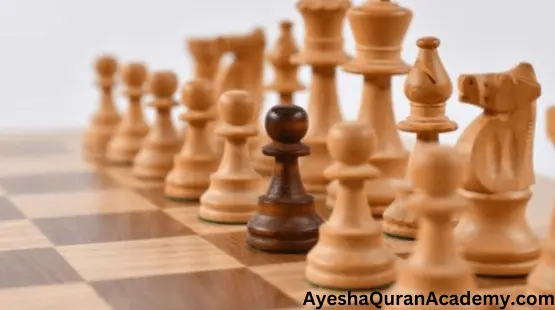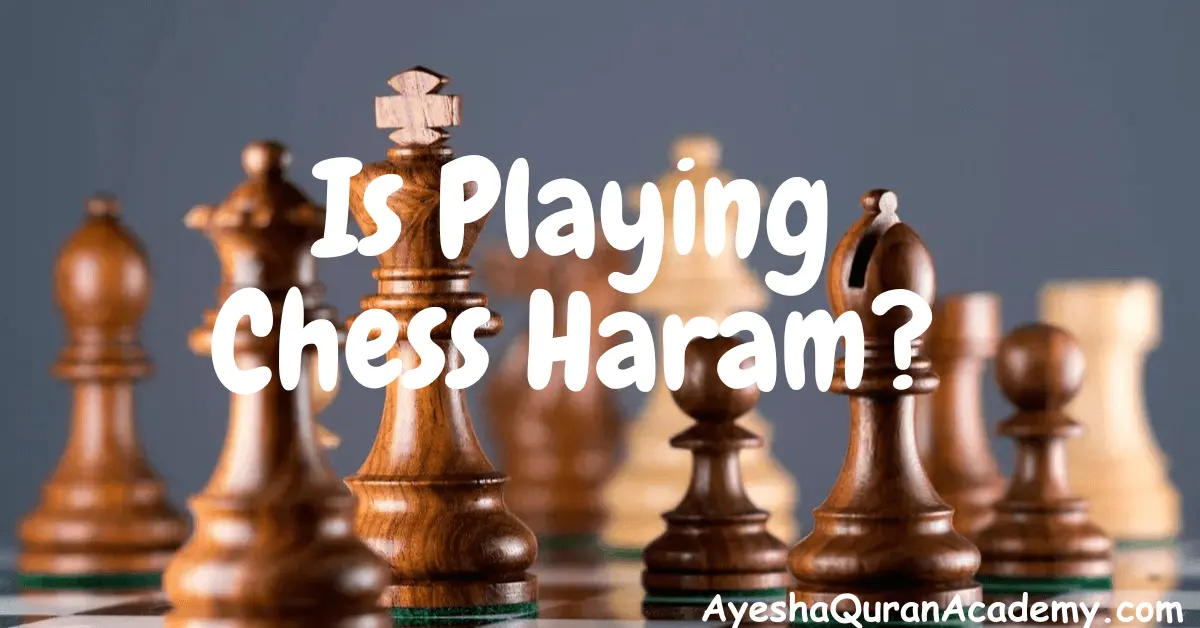In the world of board games, chess stands as an icon of strategy, skill, and intellect. However, within the context of Islamic teachings, a question has loomed for centuries: Is chess haram (forbidden)?
In this article, we will explore the origins of this debate, examine various perspectives within the Islamic community, and shed light on the nuanced stance that Islam takes on this ancient game.
The Historical Context of Chess
Chess Origins and Early Popularity
Chess, believed to have originated in India around the 6th century, quickly gained popularity throughout the Islamic Golden Age.
Its name, “shatranj,” was derived from the Sanskrit word “chaturanga,” which represented the four divisions of the military.
Chess as a Symbol of Intellectual Pursuit
In the Islamic Golden Age, chess was welcomed as a way to sharpen the mind. Scholars like the renowned mathematician Al-Kindi considered it a tool for building strategic thinking and mental sharpness.
Is Chess Haram In Islam?
Simply, Playing Chess as a sport or hobby is not Haram. Most academics agree that playing chess is Haram if gambling is involved.
Chess, often regarded as the “game of kings,” has been the subject of debate among Islamic scholars.
While some argue that it is a harmless pastime promoting critical thinking and strategy, others believe it has elements that may conflict with Islamic teachings. Let’s explore this topic further.
The Historical Perspective
To understand the controversy surrounding chess, we must delve into its history. Chess, originally known as “shatranj,” has roots in ancient India and Persia. It gradually spread to the Islamic world during the 7th century.
At that time, scholars held diverse opinions about the game, with some endorsing it as a valuable intellectual pursuit and others expressing concerns.
Interpretations of Islamic Law
The debate centers on how chess aligns with Islamic jurisprudence. Proponents argue that chess is a game of skill and mental acuity, much like other board games.
They contend that as long as it does not lead to neglect of religious duties or immoral behavior, it is permissible.
Conversely, opponents highlight certain elements of chess that they find problematic, such as its association with gambling, potential distractions from religious obligations, and the presence of figurative pieces, which some interpret as a form of idolatry.
Understanding the Controversy
The debate over whether chess is haram revolves around various factors, making it a nuanced issue. Here are some key aspects to consider:
1. The Intent of Play
In Islam, intentions matter greatly. If one plays chess with the intention of improving their cognitive abilities and not as a means of gambling or wasting time, it may be considered more acceptable.
2. Impact on Religious Duties
Critics argue that excessive chess playing could detract from fulfilling religious duties, such as daily prayers and reading the Quran.
However, proponents contend that moderation is key, and responsible play can coexist with religious obligations.
3. Gambling Concerns
Some scholars express concern about the potential for chess to involve gambling, especially when stakes or bets are involved. This aligns with Islamic principles against gambling.
4. Figurative Pieces
The presence of figurative pieces on a chessboard has been a point of contention.
Some argue that these pieces resemble idols and, therefore, should be avoided, while others see them as symbolic representations without any idolatrous significance.
Is Online Chess Haram?
The question of whether playing chess online is considered haram in Islam is a complex one, much like the ongoing debate around traditional chess.
As with any leisure activity, the key is to engage in moderation, with good intentions, and in a responsible manner.
In the digital age, chess online provides a platform for intellectual growth and strategic thinking, which are in line with Islamic principles when practiced mindfully.
Ultimately, the decision to play online chess, like its physical counterpart, is up to the individual and their commitment to upholding their faith and values.
To navigate this digital chess dilemma, it is essential to approach the matter with understanding and respect for the various perspectives within the Islamic community.

Benefits of Playing Chess
Enhanced Cognitive Abilities
1. Critical Thinking
Chess demands players to analyze complex positions, predict opponents’ moves, and devise strategies. This ongoing mental workout hones critical thinking, enhancing decision-making in all life’s aspects.
2. Problem-Solving
Every game of chess brings distinct challenges, requiring players to find inventive solutions within the rules. This nurtures a robust problem-solving mindset applicable to real-life situations.
3. Memory Improvement
Chess demands players to remember previous moves, opening theories, and patterns. This continual memory exercise enhances memory retention and recall abilities.
4. Concentration
Chess requires unwavering concentration throughout a game, as losing focus for a moment can lead to a significant disadvantage. This skill can be invaluable in improving overall concentration levels.
5. Planning and Forecasting
Triumph in chess relies on planning several moves ahead and foreseeing your opponent’s reactions. This forward-thinking approach improves one’s skill in strategizing and predicting results in diverse situations.
Life Skills
1. Decision-Making
Chess hones decision-making abilities, as players must evaluate options and choose the best course of action. These skills are transferable to everyday life choices.
2. Time Management
Chess players learn to manage their time effectively during games, a skill that can benefit them in time-sensitive situations outside of chess.
Disadvantages of Playing Chess
1. Time-Intensive
Chess games can be time-consuming, particularly when played at a competitive level. This extensive time investment can detract from other essential responsibilities and activities.
2. Neglect of Other Interests
Intense devotion to chess may lead to the neglect of other hobbies and interests. This can limit personal growth and diversification of skills.
3. Obsessive Behavior
Some individuals may become obsessed with chess, prioritizing it above all else. This obsession can interfere with personal relationships and daily responsibilities.
4. Gaming Addiction
In the digital age, online chess platforms can lead to gaming addiction for some players, causing disruptions in work, education, and daily life.
5. Eye Strain
Staring at a chessboard or computer screen for extended periods can strain the eyes and potentially lead to vision problems.
Conclusion
The status of chess in Islam, whether it’s haram (forbidden) or not, varies based on interpretation and personal beliefs.
While some scholars and individuals discourage it, many see chess as a valuable game that nurtures critical thinking and strategy without conflicting with Islamic principles when played responsibly.
In the end, the choice to play chess is a personal one, influenced by an individual’s intentions and commitment to fulfilling their religious obligations.
In the end, it is essential to approach this debate with an open mind, respecting the diversity of opinions within the Islamic community.
Frequently Asked Questions
Online chess can stimulate critical thinking, strategic planning, and problem-solving skills, which can be valuable for personal development when engaged in responsibly.
Online chess is not inherently gambling, but if it involves betting or gambling elements, it may fall under the category of haram activities.
Yes, Muslims can play online chess, provided they do so with noble intentions, avoid gambling elements, and prioritize their religious duties.


